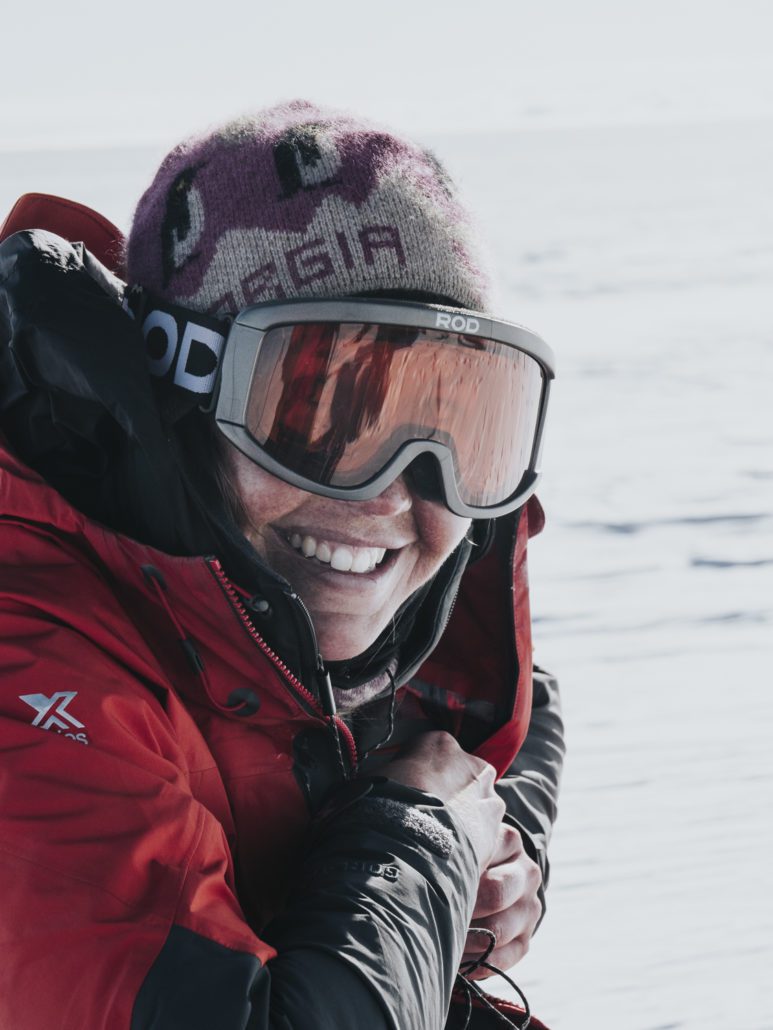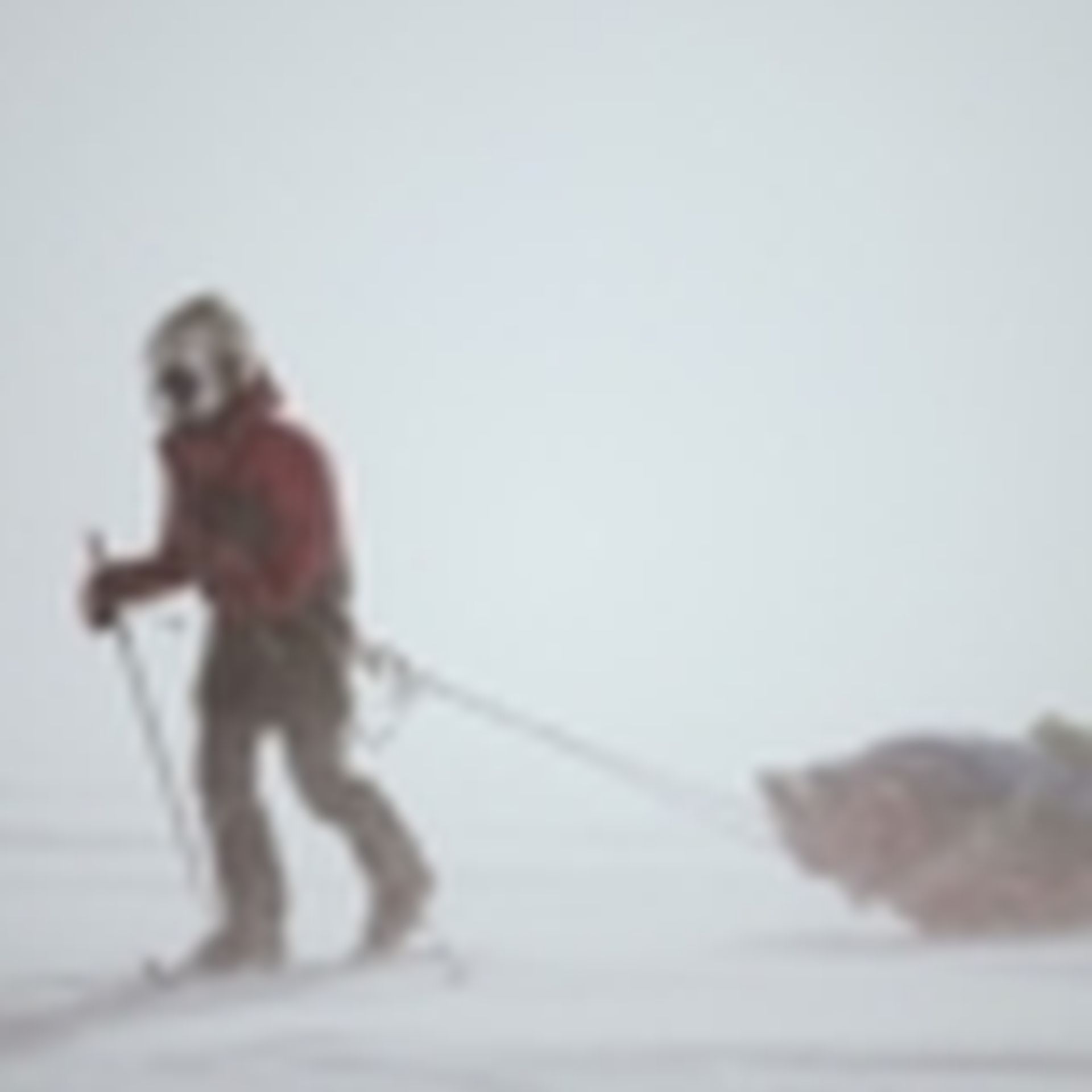Skiing Down a Sea of Clouds
After some time for reflection following the completion the mammoth crossing of the Greenland ice cap, we caught up with Bridget Kruger to hear her perspective on the expedition, the biggest challenges she faced, and what she learned about herself through the experience…
 Keith Parsons
Keith Parsons My most awe-inspiring moment happened in the last 21 hours of the expedition. It was a magical, fantasy-like day. We started to see mountains emerge out of the vast whiteness around us – the first real thing we had seen in 27 days. As the mountains grew into view, we skied closer to the sea and were finally going downhill. It was a lot of fun. We were giggling and having such an amazing time, feeling pumped up on good energy. As the day grew into night, the sun set over four or five hours, blanketing us in this stunning light that sparkled off the snow. The moon was rising, a huge, gorgeous firey orb. The scene looked like we were skiing down on this sea of clouds to meet the moon. It was the most beautiful evening of my life, and the images will be forever imprinted on my memory. There was a moment when we all were trying to make it down a particularly steep part, and everyone had their different methods – walking their sleds like dogs, or riding their sleds. It was pure chaos, like an outdoor circus, one you just couldn’t take your eyes off.
What was the most challenging part?
The most challenging part was the last week leading up to the end, as we were catching up lost time. It was intense for everyone as we were doing long hours and still facing crazy weather and deep snow. I had been quite sick, so my body was already exhausted, and then the long days evoked some old head injury symptoms. I find it hard to balance and to see properly when I am incredibly tired, and my personality completely disappears. I go into in survival mode while my brain just wants to shut my body down and make it sleep to recover. This was a particularly difficult time, because I had to rely so much on the help of others, even when they were tired themselves. I felt like a burden to the team at this point. I am so lucky that they were so supportive during that time, as I wouldn’t have made it through without them.
What went through your mind when you finally completed the expedition?
We had this beautiful moment at the end, where we had arrived at this non-descript point (it had started to fog up again and we could no longer see the mountain in front of us), when Keith let Hollie, Brando and myself know that we were at the end. We didn’t realise we had made it. We had just walked across a country. It was so amazing, there were tears of relief and joy; and we all just hugged each other and congratulated and thanked each other for the journey.
What did you learn or discover about yourself?
I discovered how much the body can endure and just keep going. It is the mind that falters first. What thoughts you feed into your brain completely influence your feelings and energy. Depending on what you were thinking about each hour greatly affected each leg of the day – it almost became an experiment.
In the first few weeks before we started doing huge days, we had so much time to think. It is so interesting where the mind goes, how you fill in that time and what you realise are the most important things to you. It was a gift to have this time and space to reflect on life and work through ideas and process anything that needed it.
What skills did you have that you found most valuable?
I have completed a lot of long-term journey expeditions, I think this really helped with the mindset of being out there for so long and what to expect.
A comment about the team itself?
The team was incredible. I wouldn’t have made it without such strength, support and love from them. The boys helped so much with extra weight when we were sick, and Holly was the most amazing tent mate to share the journey with. She inspired me every day with her empowerment quotes and positivity.
What was something you experienced that was different to your expectations?
The weather was much more intense than I imagined. I had completed a short training trip beforehand, which gave me a good indication of how hard this journey was going to be. I haven’t been just a participant on an expedition in almost a decade, so it was a really amazing opportunity for me to sink into the journey and allow myself to feel some of the struggles, instead of having to constantly look after others. It was a journey that well and truly put me out of my comfort zone, which was a nice thing to reconnect with. Engaging with that process again will benefit my work with others when I facilitate journeys that challenge them.
Reflecting on what you know of Nansen’s crossing – what would you consider some of the similarities and key differences on this trip?
It is unbelievable to me that a 27-year-old man decided to go to a different country and ski across an area with no knowledge of where the crevasses were (we had a GPS marking several of the big ones) and navigate through that minefield. Not only that, thinking of the gear we had to keep us warm and the lightness of the food we carried in comparison to Nansen’s team, it is absolutely mind blowing what they accomplished.
How have you been inspired to go out and share your story?
I am really excited about sharing my story with young people, especially in remote communities. I grew up in a remote area and one day, at my small school, a man came in and showed us pictures and clothing from his journey to Antarctica. It blew my mind that people could explore those places. I want to be able to give that inspiration to others. I especially want to get across the message that anyone from anywhere can go out into the world and create their own magic and explore the depths of their desires, whether it is having a curiosity about far away places or exploring a profession they never thought possible.
What did you miss most when you were away?
I spent a lot of time thinking about my loved ones but I often spend time cut off from civilization. It is the small things you miss the most – being able to go to the bathroom without risk of getting more frostbite, having the wind blast at you and snow drip down your back as you go about your business, being able to eat just one piece of fresh fruit, not having to defrost everything that has frozen throughout the day or night, or being able to put your shoes on without 15 minutes of struggle as you force your foot into a solid ice-block, which has frozen at an awkward angle.
What messages will you be giving to audiences about the trip?
I will be talking about the journey within, facing your darker self, the importance of an amazing team, and realising what you are capable of.
Would you recommend others apply for future expeditions and why?
I believe these expeditions are one of the most valuable things anyone could apply for and be part of. Being connected to so many beautiful unique geniuses, who inspire you every day, is such a pleasure. And the challenges you face motivate you to see your full potential. I think it is so incredibly empowering.

 Keith Parsons
Keith Parsons